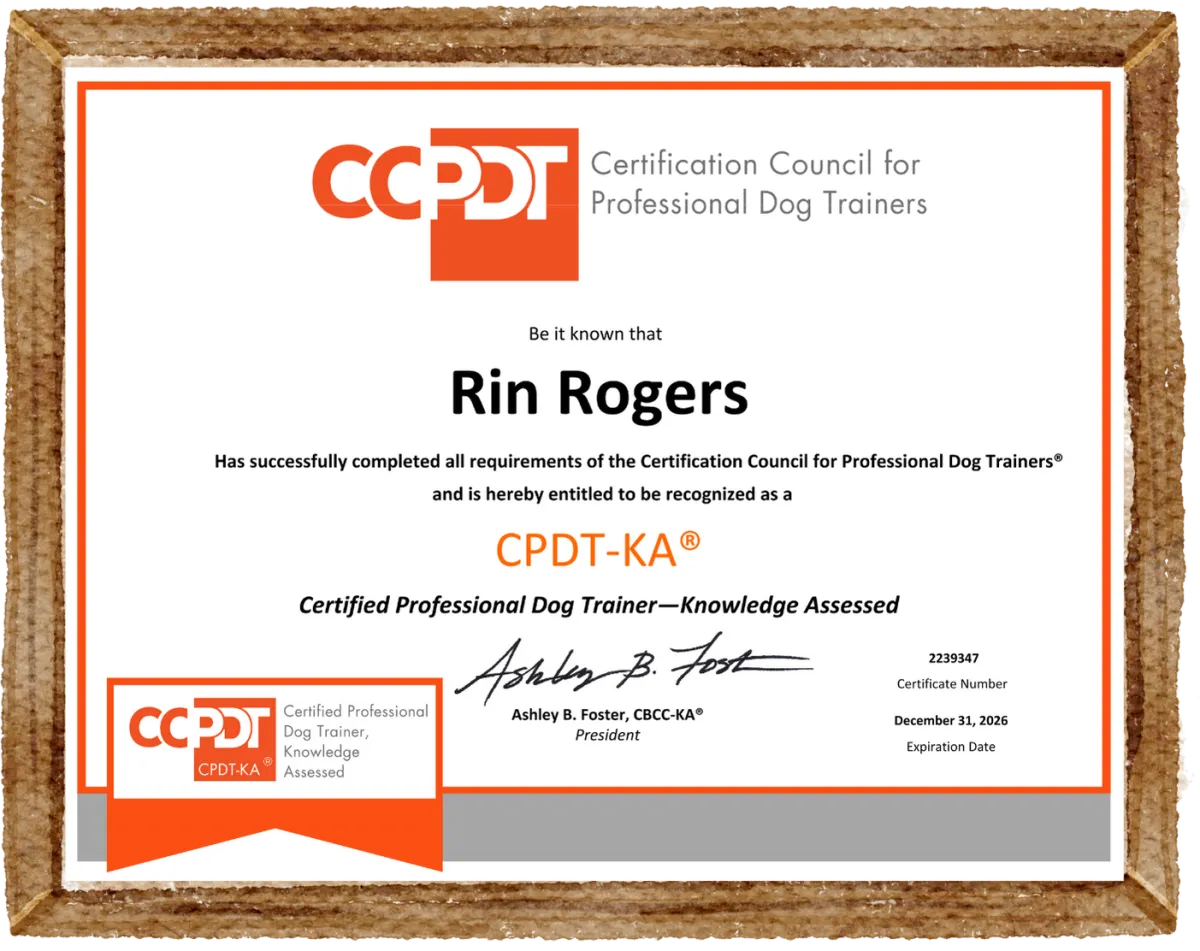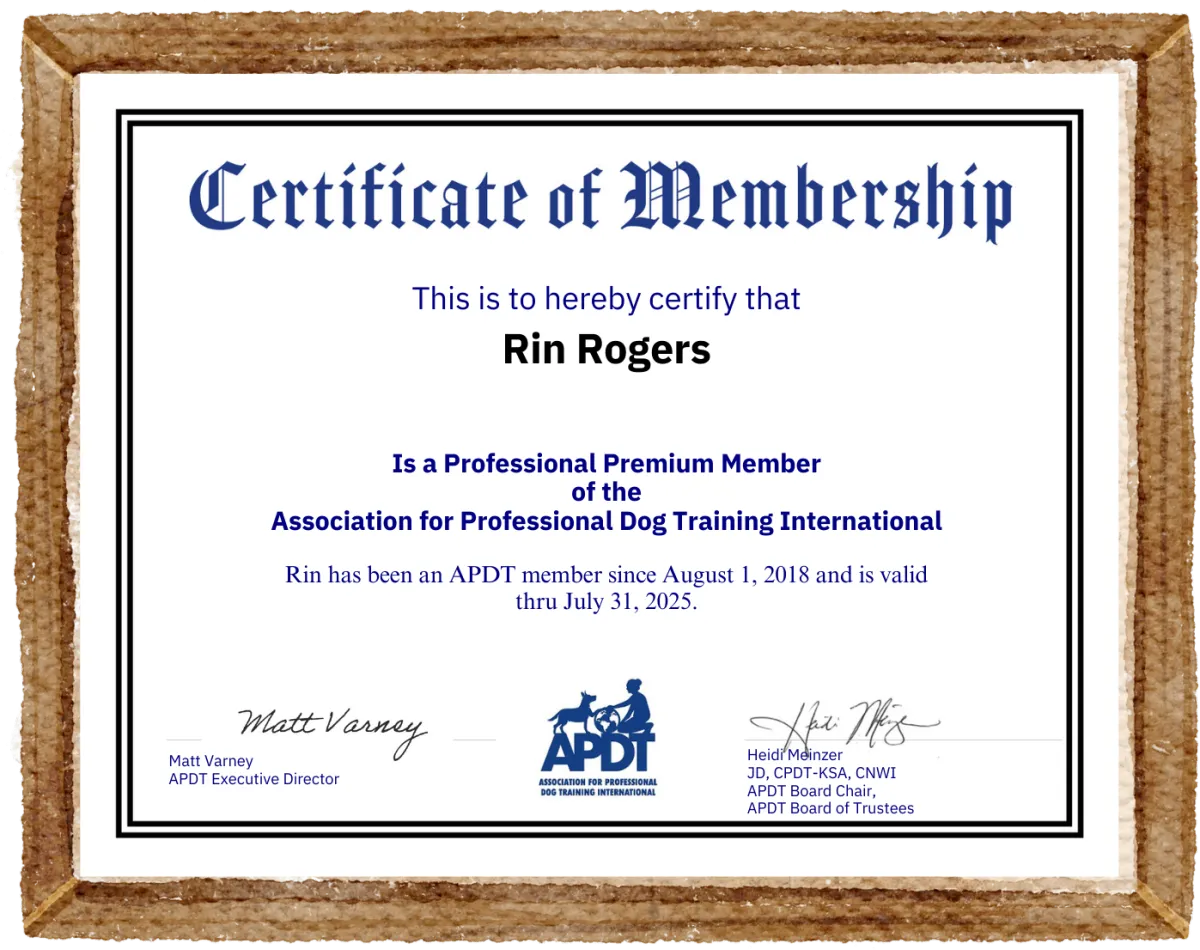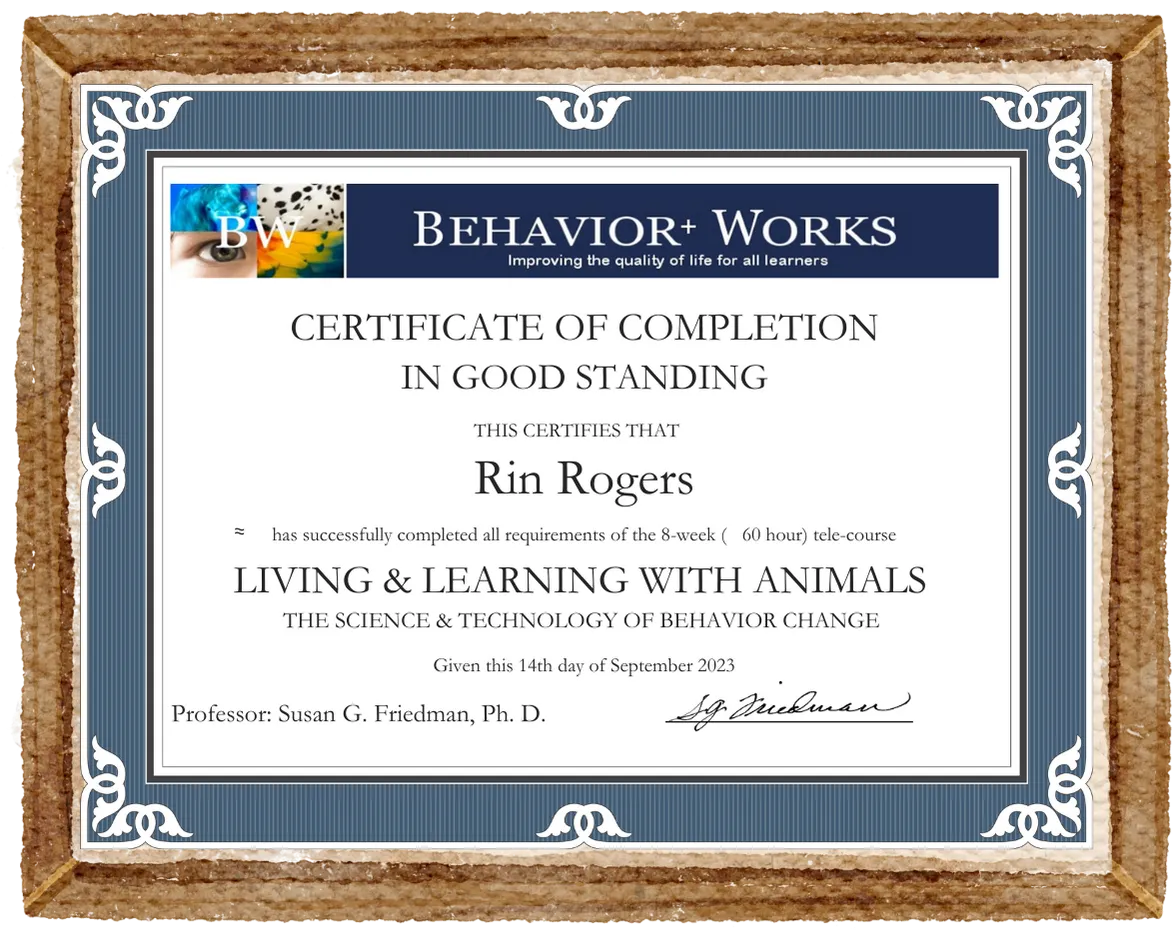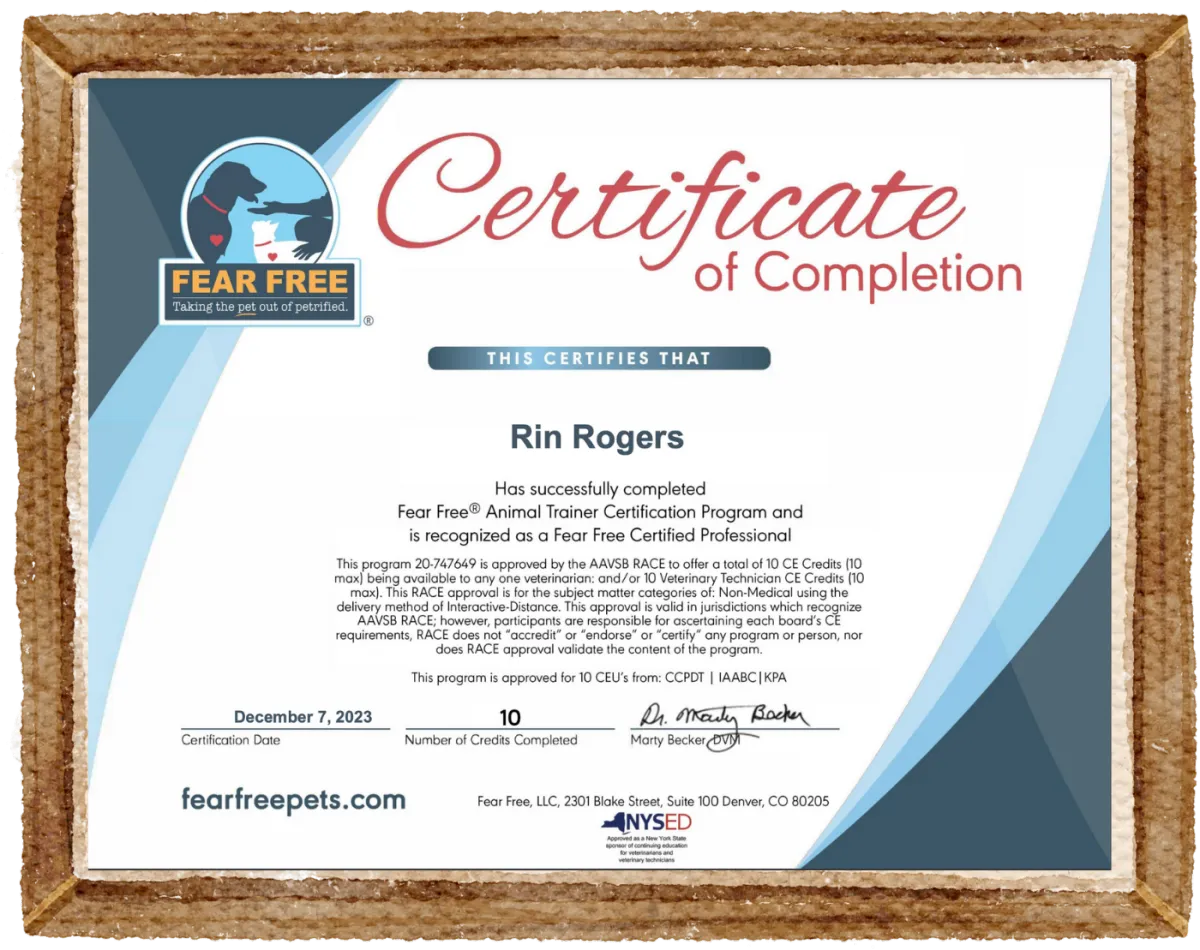The method you choose matters.
Traditional training involves the use of fear, pain, and compulsion. Sadly, these methods are still prevalent in the world of dog training today, often being cited as the “only” way to get an unruly dog under control.
This is wildly untrue.
Enchanted Companions Dog Training is pleased to offer an ethical and compassionate alternative to the community of Rutherford County. Using positive reinforcement techniques and the science of applied behavior analysis, your dog will be trained effectively and kindly, and you’ll be a part of expanding the practice of humane animal handling and training.


The method you choose matters.

Traditional training involves the use of fear, pain, and compulsion. Sadly, these methods are still prevalent in the world of dog training today, often being cited as the “only” way to get an unruly dog under control.
This is wildly untrue.
Enchanted Companions Dog Training is pleased to offer an ethical and compassionate alternative to the community of Rutherford County. Using positive reinforcement techniques and the science of applied behavior analysis, your dog will be trained effectively and kindly, and you’ll be a part of expanding the practice of humane animal handling and training.

Meet Your Trainer
Rin Rogers KPA CTP, CPDT-KA
Training dogs professionally in Murfreesboro since 2018, Rin Rogers founded Enchanted Companions Dog Training, a haven for dogs and their families seeking a harmonious and positive training experience. Here, the principles of respect, trust, and kindness are at the heart of every lesson.
At the age of 20, Rin took on a contract to become the Head Animal Trainer and Enrichment Specialist at Kentucky Down Under Zoo. While there, she worked to better the lives of a variety of animals, including wolves, dingoes, foxes, kangaroos, and exotic birds, as well as several species of farm animals. Understanding of animal behavior and the importance of positive reinforcement are the cornerstones of Rin’s training, yielding transformative results for all animals- but especially canines and their human counterparts.
Rin is proud to have founded Not-For-Pawfit, a community outreach program which offers free and low-cost training and training resources to those who otherwise couldn’t afford it. She also fosters dogs, working with several local rescue organizations in a mission to get dogs out of the shelter and into their forever homes. Her unwavering commitment to the well-being of all dogs (and their people!) is a testament to the profound impact that compassionate training can have on our four-legged companions.

Meet Your Trainer
Rin Rogers KPA CTP, CPDT-KA
Training dogs professionally in Murfreesboro since 2018, Rin Rogers founded Enchanted Companions Dog Training, a haven for dogs and their families seeking a harmonious and positive training experience. Here, the principles of respect, trust, and kindness are at the heart of every lesson.
At the age of 20, Rin took on a contract to become the Head Animal Trainer and Enrichment Specialist at Kentucky Down Under Zoo. While there, she worked to better the lives of a variety of animals, including wolves, dingoes, foxes, kangaroos, and exotic birds, as well as several species of farm animals. Understanding of animal behavior and the importance of positive reinforcement are the cornerstones of Rin’s training, yielding transformative results for all animals- but especially canines and their human counterparts.
Rin is proud to have founded Not-For-Pawfit, a community outreach program which offers free and low-cost training and training resources to those who otherwise couldn’t afford it. She also fosters dogs, working with several local rescue organizations in a mission to get dogs out of the shelter and into their forever homes. Her unwavering commitment to the well-being of all dogs (and their people!) is a testament to the profound impact that compassionate training can have on our four-legged companions.
“Hiring Rin was a GAME CHANGER for our family. We’ve seen a huge change in Bear’s behavior!”
-Nicole P.
So, what do all those letters stand for?
Unfortunately, there is no formal regulation in the United States for dog trainers, meaning that many unqualified “trainers” perpetuate the use of forceful methods while remaining both legally and societally unchecked. To combat this, the world of science-based training has come together to found several professional organizations, and these alliances represent a collaborative effort to promote and advocate for training methods rooted in humane, empirically-based research surrounding dog cognition and behavior.
Through partnerships, collaborative initiatives, and the sharing of best practices, these organizations are on a collective mission to improve the world of dog training. They prioritize education and awareness, ensuring that both trainers and dog owners have access to the latest research and tools that support humane, effective training methods. Some of these organizations offer professional certifications, of which Rin Rogers holds several prestigious accreditations, many of which are listed below.
KPA CTP
The Karen Pryor Academy Certified Training Partners program is highly regarded for its quality curriculum, commitment to morally sound training practices, and demanding testing standards.
To become a KPA CTP, trainers must pass both written and practical assessments of technical knowledge including current positive reinforcement training techniques, learning theory, ethical standards, and professionalism. Despite being one of the most esteemed programs in the animal training industry, fewer than 200 KPA CTP’s are certified per year out of thousands of applicants.


CPDT-KA
To become a Certified Professional Dog Trainer - Knowledge Assessed, trainers must demonstrate a strong knowledge of learning theory, behavior modification principles, canine ethology, and effective training methodologies. The certification process involves passing a thorough exam that assesses theoretical knowledge across various domains, including canine cognition, learning processes, behavior problem-solving, animal husbandry and handling, and instruction skills.
Holding a CPDT-KA certification signifies a trainer's commitment to staying informed about scientifically sound and humane training methods, ensuring they can effectively support dogs and their owners in achieving behavioral goals while prioritizing the well-being and positive relationship between humans and their canine companions.
Behavior Works LLA
Founded and lead by Dr. Susan G. Friedman, the completion of the Behavior Works Living and Learning with Animals program exemplifies a deep understanding of the following principles:
- An evolutionary understanding of learning and behavior.
- The philosophy of behaviorism.
- A systematic model for building behavior-change interventions.
- The ABC approach to assessing the functional relationships between behavior and environmental conditions.
- The teaching technology of applied behavior analysis, and the ability to utilize it with non-human animals and their contexts.
- An ethical guideline for selecting training procedures based on the least intrusive principle and a procedural hierarchy.


Fear Free Council of America
The Fear Free Animal Training Certification Program is a specialized credential designed for animal professionals, including trainers, veterinarians, and behaviorists, emphasizing compassionate, low-stress handling techniques to reduce fear and anxiety in animals.
This certification focuses on understanding an animal's emotional state and implements strategies to create a comfortable, fear-free environment during training, handling, and veterinary care.
Professionals who attain this certification demonstrate a commitment to ensuring the emotional well-being of animals, enhancing the training experience, and fostering trust between animals and their caregivers or trainers.
Association of Professional Dog Trainers
The Association of Professional Dog Trainers is an animal training organization that requires all of its members to abide by a strict code of ethics, as well as adhere to a professional framework, outlined below:
- Understand and promote Least Intrusive, Minimally Aversive (LIMA) training and behavior work.
- Continue professional development by reading relevant material; attending conferences, workshops and seminars; and pursuing other educational opportunities.
- Review and understand source material and academic texts for information.
- Abstain from representing training and behavioral information as scientific, unless the information is derived from peer-reviewed and published research.
- Refrain from offering guarantees regarding the outcome of training and behavior work.
- Always maintain professionalism through providing services honestly, treating animals and clients respectfully, valuing and preserving the privacy of clients, and maintaining professionalism with colleagues and other professionals


Pet Professional Guild
The Pet Professional Guild is an international membership organization dedicated to advancing humane, science-based, force-free training and care practices for pets and other animals. It serves as a professional community and resource network for trainers, behavior consultants, pet care providers, veterinarians, shelter and rescue professionals, and pet owners who share this commitment.
PPG upholds three core principles:
-The exclusive use of force-free methods that avoid pain, fear, or intimidation
-Training and care grounded in modern learning theory and scientific evidence
-A guiding philosophy of being informed by science, guided by empathy, and governed by ethics
So, what do all those letters stand for?
Unfortunately, there is no formal regulation in the United States for dog trainers, meaning that many unqualified “trainers” perpetuate the use of forceful methods while remaining both legally and societally unchecked. To combat this, the world of science-based training has come together to found several professional organizations, and these alliances represent a collaborative effort to promote and advocate for training methods rooted in humane, empirically-based research surrounding dog cognition and behavior.
Through partnerships, collaborative initiatives, and the sharing of best practices, these organizations are on a collective mission to improve the world of dog training. They prioritize education and awareness, ensuring that both trainers and dog owners have access to the latest research and tools that support humane, effective training methods. Some of these organizations offer professional certifications, of which Rin Rogers holds several prestigious accreditations, many of which are listed below.

KPA CTP
The Karen Pryor Academy Certified Training Partners program is highly regarded for its quality curriculum, commitment to morally sound training practices, and demanding testing standards.
To become a KPA CTP, trainers must pass both written and practical assessments of technical knowledge including current positive reinforcement training techniques, learning theory, ethical standards, and professionalism. Despite being one of the most esteemed programs in the animal training industry, fewer than 200 KPA CTP’s are certified per year out of thousands of applicants.

CPDT-KA
To become a Certified Professional Dog Trainer - Knowledge Assessed, trainers must demonstrate a strong knowledge of learning theory, behavior modification principles, canine ethology, and effective training methodologies. The certification process involves passing a thorough exam that assesses theoretical knowledge across various domains, including canine cognition, learning processes, behavior problem-solving, animal husbandry and handling, and instruction skills.
Holding a CPDT-KA certification signifies a trainer's commitment to staying informed about scientifically sound and humane training methods, ensuring they can effectively support dogs and their owners in achieving behavioral goals while prioritizing the well-being and positive relationship between humans and their canine companions.

Behavior Works LLA
Founded and lead by Dr. Susan G. Friedman, the completion of the Behavior Works Living and Learning with Animals program exemplifies a deep understanding of the following principles:
- An evolutionary understanding of learning and behavior.
- The philosophy of behaviorism.
- A systematic model for building behavior-change interventions.
- The ABC approach to assessing the functional relationships between behavior and environmental conditions.
- The teaching technology of applied behavior analysis, and the ability to utilize it with non-human animals and their contexts.
- An ethical guideline for selecting training procedures based on the least intrusive principle and a procedural hierarchy.

Fear Free Council of America
The Fear Free Animal Training Certification Program is a specialized credential designed for animal professionals, including trainers, veterinarians, and behaviorists, emphasizing compassionate, low-stress handling techniques to reduce fear and anxiety in animals.
This certification focuses on understanding an animal's emotional state and implements strategies to create a comfortable, fear-free environment during training, handling, and veterinary care.
Professionals who attain this certification demonstrate a commitment to ensuring the emotional well-being of animals, enhancing the training experience, and fostering trust between animals and their caregivers or trainers.

Association of Professional Dog Trainers
The Association of Professional Dog Trainers is an animal training organization that requires all of its members to abide by a strict code of ethics, as well as adhere to a professional framework, outlined below:
- Understand and promote Least Intrusive, Minimally Aversive (LIMA) training and behavior work.
- Continue professional development by reading relevant material; attending conferences, workshops and seminars; and pursuing other educational opportunities.
- Review and understand source material and academic texts for information.
- Abstain from representing training and behavioral information as scientific, unless the information is derived from peer-reviewed and published research.
- Refrain from offering guarantees regarding the outcome of training and behavior work.
- Always maintain professionalism through providing services honestly, treating animals and clients respectfully, valuing and preserving the privacy of clients, and maintaining professionalism with colleagues and other professionals

Pet Professional Guild
The Pet Professional Guild is an international membership organization dedicated to advancing humane, science-based, force-free training and care practices for pets and other animals. It serves as a professional community and resource network for trainers, behavior consultants, pet care providers, veterinarians, shelter and rescue professionals, and pet owners who share this commitment.
PPG upholds three core principles:
-The exclusive use of force-free methods that avoid pain, fear, or intimidation
-Training and care grounded in modern learning theory and scientific evidence
-A guiding philosophy of being informed by science, guided by empathy, and governed by ethics

© 2026 Enchanted Companions Dog Training, All rights reserved.


